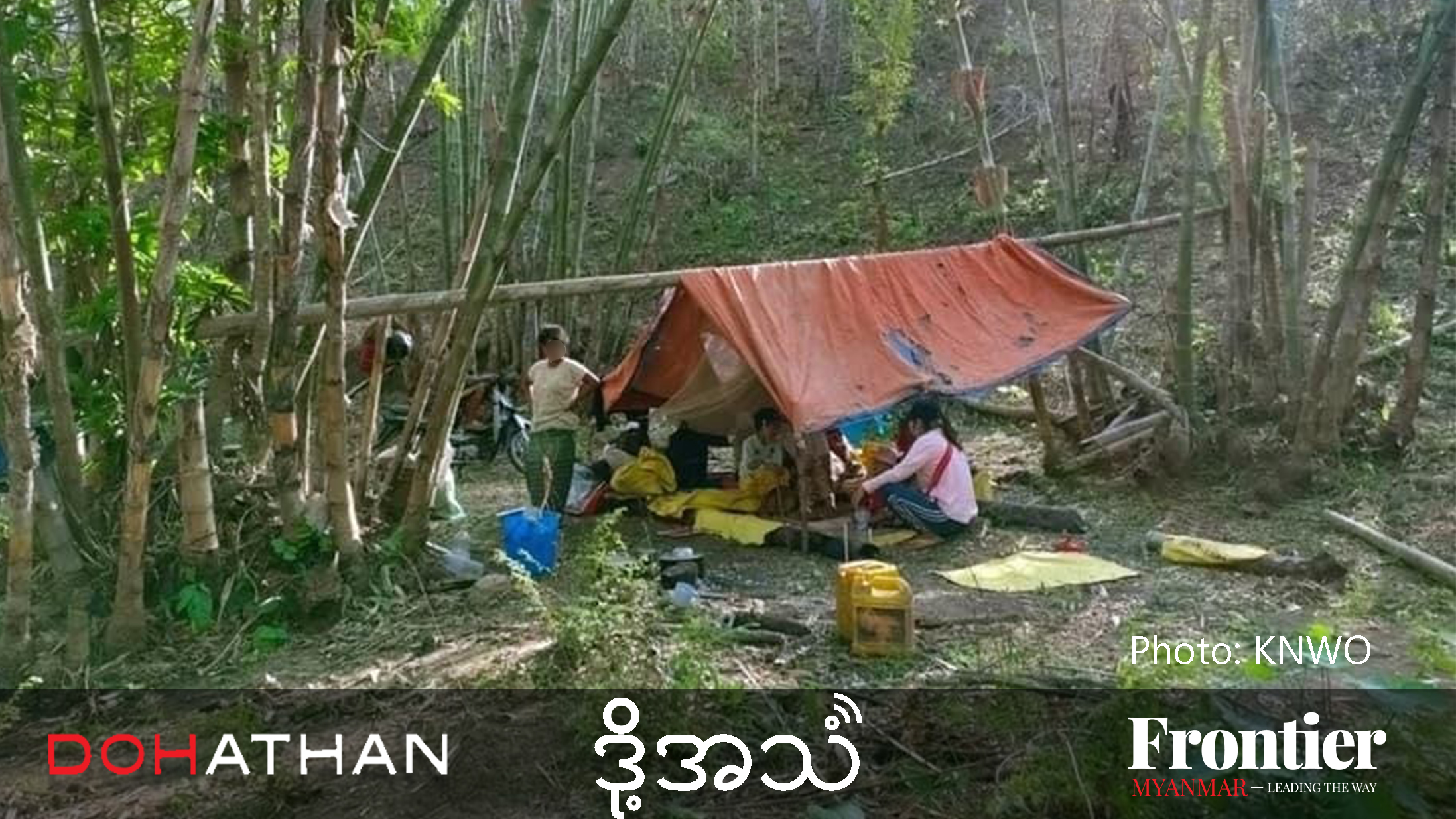Online loan app scams have exploded in Myanmar amid a deep economic crisis, trapping victims with predatory interest rates and blackmailing them after accessing their personal data.
By FRONTIER
Ma Khine*, a 34-year-old factory worker in Yangon, only gets paid K210,000 per month making clothes for a Chinese company – around US$63 at the market rate. Faced with soaring commodity prices, in August she downloaded a mobile application for quick loans called Flash Cash. She submitted the required information, including a photograph of her Citizenship Scrutiny Card, and accepted the privacy settings.
To start, Ma Khine requested a modest K50,000, but was puzzled when only K35,000 was transferred into her Wave Pay account. When she contacted the company’s listed phone number, a representative explained that K15,000 had been preemptively deducted as interest for the first 10 days, but she still needed to repay the entire K50,000.
“Because of the high interest rates, I said that I don’t want the loan anymore, and I sent back the K35,000. But the record of taking a loan didn’t disappear, and the interest rates kept going up every day,” she said.
Then the phone calls started.
“Not only me, but also my friends, parents and other relatives started getting calls demanding that they pay back the loan,” she said. “I was so sorry for my friends because they weren’t simply asking for money, but were speaking rudely.”
After a month, Ma Khine checked the app again and found that, with interest, the outstanding loan had climbed to over K100,000.
Fellow Yangon resident Ma Wai Wai Myint*, 32, had a similar experience with an app called Pigeon Loan, which she downloaded in April after seeing a Facebook advertisement. She was in less desperate need for money than Ma Khine, but the ad promised quick cash with a low interest, so she decided to test it out with a small loan.
When downloading the app, users must approve permissions requests to access phone contacts, user location, photos and other files on the phone and even to read messages. Like many other users, Wai Wai Myint was eager to begin using the app and didn’t read the fine print.
“You can borrow loans from K20,000-100,000, but it says the interest is 20 percent if you repay the loan within 1-3 months and 30pc if you repay within 3-6 months,” she said. “So I thought if I borrowed for just one month, I would pay a small amount of interest. But after I took the loan, the app showed that the interest rate increased by 20pc per month.”
She borrowed just K20,000, but like Ma Khine only received K14,000. Because of the high interest rate, Wai Wai Myint repaid the loan in full within a week, decided not to recommend the platform to her friends, and deleted the app from her phone. But unbeknownst to her, her personal information had been stolen.
About one month later, Wai Wai Myint’s mother in Bago Region received a menacing phone call from an unknown number, threatening to sue her daughter and expose her online as a cheat if she didn’t pay back her loan. Nervous and confused, her mother sent K50,000 via Wave Pay mobile app. After learning what happened, Wai Wai Myint called the same phone number to try to get to the bottom of things but only found more threats.
“They said they already had my personal information and photos, so they told me to pay another K100,000 if I didn’t want them to be distributed. I told them I wouldn’t and demanded that they return the K50,000 they had taken from my mother, and also told them if they didn’t pay it back I would go to the police,” she said.
A surge in scams
Wai Wai Myint followed through, but found the police unhelpful, saying they simply registered her complaint and never found the culprits.
A senior official from the Yangon Region office of the Department of Consumer Affairs, who asked to remain anonymous, said complaints about this type of fraud have skyrocketed since last year. He said from 2019-2021 there was an average of 2,000 fraud complaints a year, mostly related to food and beauty products, with only around 46 complaints per year about loan scams. But last year, there were 2,400 complaints related to online loans alone.
U Zaw Naing director general of the Financial Regulatory Department at the Ministry of Planning and Finance, said the applications issuing loans without proper registration are illegal, but the nature of the scamming operations make it hard to crack down on them.
“We can’t take action immediately because there’s no information about them, so it takes time to investigate these unregistered illegal online lending businesses,” he said.

Because the companies aren’t officially registered, the authorities don’t know where they’re operating from, and the addresses listed online are often fake.
For example, Pigeon Loan is registered to an address in the Kantharyar Centre Office Tower in Yangon’s Mingalar Taung Nyunt Township, but when Frontier contacted the building directory, they said there was no company with that name there.
“The addresses of many of these apps are listed in Yangon, which means the complaints come to the Yangon Region office,” said the consumer affairs official. “When the consumer affairs department receives complaints, they sort through them and conduct field inspections in the respective townships by team,” he said, explaining that authorities went to some of the addresses of the companies listed online, but came up empty-handed.
“Because it is difficult to find the location of those who make the app, the most effective thing we can do is to announce that they’re dangerous apps in order to inform the public,” he added.
In June, the Department of Consumer Affairs published a warning against dangerous online money lending applications, listing 35 including Flash Money and Pigeon Loan. After the statement was issued, some of the applications were taken down from the Google Play store, but can still be downloaded through other websites.
When companies are officially registered, it’s much easier for authorities to take action.
For example, on October 26 the military regime announced that 95 people working for the Supportfix and Zhan Tu money lenders – both registered in Yangon Region with the Directorate of Investment and Company Administration – were arrested for collecting personal information and selling it to third parties.
The companies allegedly collected personal information while posing as job search companies and sold it to scammers who blackmailed the victims, threatening to publish their personal information online if they didn’t pay.
The senior official from the Department of Consumer Affairs’s Yangon office said after they received complaints about threatening phone calls demanding payment, they were able to trace the phone numbers back to the companies.
“At first, I thought it was a small case of information fraud and money fraud, but when the team investigated it, we discovered people who lied and accessed the information on the pretext of being a job search company, then found people who would buy the information,” he said.
The other consumer affairs official similarly said that the primary purpose of many of the money-lending apps isn’t predatory loans, but collecting personal information for blackmail.
“Their main target is people in the rural villages who don’t use the internet much and don’t have access to updated information, such as the elderly, or young people who are active online but are afraid of having their personal information spread on social media,” he explained.
Posting personal information
After Ma Khine deleted the Flash Money app, she thought ignoring the problem would make it go away, but there was another rude surprise in store. About a week later, she saw Facebook posts using her identification card and personal information advertising online loans, claiming she was a satisfied customer.
“A Facebook friend of mine showed me an online loan page that posted my information and referred me as their customer,” she said. “I never gave my information but I remember uploading pictures. The information may have been leaked through the app.”
U Myint Cho, director general of the Department of Consumer Affairs, said this is almost certainly the case.
“The information is obtained through the applications without the knowledge of the user, and is then used for other purposes,” he said.
Ma Khine saw her information posted on at least three different Facebook pages. As with Supportfix and Zhan Tu, Flash Money likely sold her data to other companies.
“Every time I saw such a post, I reported it to Facebook and asked my friends for help reporting it,” she said.
Ma Khine was shocked both because her information had been made public without her consent, but also because she was worried it could be used to trick other victims. Frontier saw around 20 similar posts of supposedly satisfied customers posted on Facebook pages advertising quick loans. When we inquired with six of the individuals in the advertisements, they all said they had tried out a loan application but had not knowingly shared their personal information.
Part of the reason many people are easily tricked by these fraudulent apps is because they function very similarly to legitimate money-lending service apps.
Ma Khine said she previously used the Mother app, which also asks for personal information, including contact information for loan guarantors. Mother Finance is a microfinance company founded in 2018 that launched a mobile application in July that year. Like the fraudulent apps, Mother asks for access to personal phone data and a national ID card, but has never been embroiled in a similar scandal or controversy.
But Ma Khine and others were drawn to the fraudulent apps because they promised money faster.
“With Mother, it took me a long time to fill out the application because it requested a lot of information in order to get a loan. For example, salary slips, company employee certification, et cetera. So I got scammed while looking for an app that was quicker and easier,” she said.
“Now I remind myself never to use such an app again.”
*indicates the use of a pseudonym for security reasons







